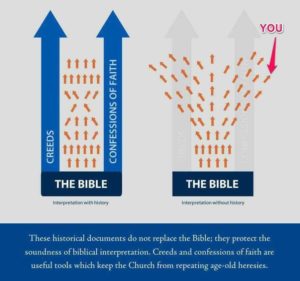 Article by Dr. Michael Reeves. president and professor of theology at Union School of Theology in Oxford, England. (Original source here)
Article by Dr. Michael Reeves. president and professor of theology at Union School of Theology in Oxford, England. (Original source here)
Christians have always written and cherished summaries of their beliefs. The Bible records the earliest of these confessions of faith (1 Tim 3:16). Then, the early post-Apostolic church produced definitive statements of essential Christian belief, such as the Apostles’ Creed and the Nicene Creed, still considered benchmarks of orthodoxy. In the centuries that have followed, Christians have continued to produce confessions: the Augsburg Confession (1530), the Thirty-Nine Articles (1562), the Westminster Confession of Faith (1646), the London Baptist Confession of Faith (1689), and so on. The church has never been without a confession or creed.
THE RECIPE AND THE PUDDING
However, for all their defining importance in Christian history, confessions of faith have met with mixed reactions from Christians. While many believers have used confessions enthusiastically, others have claimed that confessions replace a vital relationship with God with a desiccated list of doctrine, replacing the Spirit with the letter, leaving only a husk of dead, dull orthodoxy. However, to understand confessions this way is to mistake the recipe for the pudding. Confessions, like recipes, are descriptions of the vital ingredients in the Christian life of faith, not to be confused with the reality itself. That does not mean the description is unimportant: different ingredients will make a different pudding. But, if you try to eat the recipe card rather than the pudding, you will be sadly disappointed.
There is a deeper, more sinister reason for our distrust of confessions. It started in the garden of Eden when Adam and Eve refused to listen to God. Ever since then, mankind pretends that God has not spoken to us. If we admit that God has spoken, we must also admit that we knowingly disobey Him—an admission that we are not the lords and gods we daily pretend to be. Vagueness about what the Bible teaches and a lack of specificity in matters of theology maintain this Edenic error. Without confessions of faith, we are speculating in the dark, denying that God has spoken His revealing light into the world (John 1:1–5). Undisturbed by the harsh light of divine revelation, we are free to dwell in the shadows, fashioning idols to our hearts’ content, crafting a self-made religion out of comforting experiences, moralism, or whatever we choose.
History is replete with this tendency. Consider an example. In seventeenth-century England, a group of theologians called latitudinarians, tired of the never-ending theological debates that flowed from the Reformation, sought a Christianity shorn of most of its doctrine. Doctrine became a dirty word. For them, Christianity was essentially morality—the less doctrine it had, the more people could agree and unite. The problem was that this unity was built around the standards of morality rather than Christ.
In many ways, the latitudinarians were heralds of the eighteenth-century Enlightenment skepticism toward all doctrine epitomized by Edward Gibbon. In his monumental Decline and Fall of the Roman Empire, Gibbon looks despairingly at the doctrinal disputes of the early post-Apostolic church as nothing but irrelevant bickering. For example, Gibbon dismisses the Arian controversy’s debate over whether Christ is truly God (homoousios) or merely an exalted creature (homoiousios) by saying, “The difference between the Homoousion and the Homoiousion is almost invisible to the nicest theological eye.”1 For Gibbon, it was an immaterial debate over the single letter i. Yet the argument was over far more essential matters. The controversy was about whether Christ is God, whether He is to be worshiped as God. That single i divided orthodoxy from heresy, with one side claiming Christ as Creator, while the other saw Him as nothing more than a created being. Gibbon’s blithe indifference to doctrine could just as easily argue that the difference between Christianity and Islam is merely one of numbers: one (Allah) or three (Father, Son, Spirit). We know, however, that doctrinal precision matters.
HAS GOD SPOKEN?
When natural, Edenic inclinations and mainstream Western intellectual history stand together against confessions, it is easy to see how a love for confessions has become an unthinkable offense. God’s revelation, objective truth rather than subjective sentiment, offends modern culture.
That is precisely the intent of a confession—it refuses to go along with the pretense that God has not spoken. A confession asserts that God has spoken clearly and specifically. Holding to a confession is an act of humility, admitting that we are not, as we would wish, the final arbiters of truth. Instead, in our confessions we proclaim that God has given us absolute, nonnegotiable truth. Confession is our obedient response to what God has spoken. It is an acknowledgment that God is God, and that we are not. Continue reading

 Article by Jeff Robinson (original source here)
Article by Jeff Robinson (original source here) Article: John Gill, the rule of faith and baptist catholicity by David Rathel (original source
Article: John Gill, the rule of faith and baptist catholicity by David Rathel (original source  Article by by Carl R. Trueman (original source
Article by by Carl R. Trueman (original source 